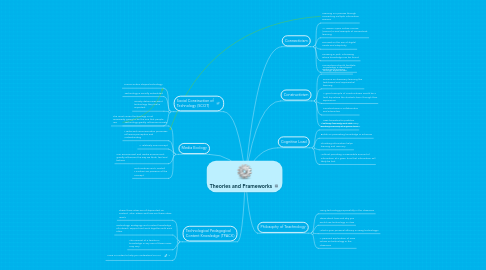Theories and Frameworks
by Ross Urquhart

1. Media Ecology
1.1. Technology greatly influences society
1.2. Media and communication processes influence perception and understanding
1.3. A relatively new concept
1.4. Our environment and media environment greatly influences the way we think, feel and behave
1.5. Neil Postman and Marshall McLuhan are pioneers of the concept
2. Social Construction of Technology (SCOT)
2.1. Human action shapes technology
2.2. Technology is socially embedded
2.3. Society determines what technology they feel is important
2.4. The most current technology is not necessarily going to be the one that people use
3. Technological Pedagogical Content Knowledge (TPACK)
3.1. These three ideas are all dependent on context. Who, where and how are these ideas used?
3.2. Technology, Pedagogy and Content knowledge all interact, support and work together with each other
3.3. The amount of a teacher's knowledge in any one of these areas may vary
3.4. Here is a video to help you understand TPACK
4. Cognitive Load
4.1. The brain has only so much working memory at a given time
4.2. Builds on preexisting knowledge or schemas
4.3. Chunking information helps learning and memory
4.4. Without providing a reasonable amount of information at a given time that information will likely be lost.
5. Constructivism
5.1. Knowledge is developed through experiences
5.2. Focus is on discovery learning like task-based and experiential learning
5.3. A good example of constructivism would be a field trip where the students learn through their experience
5.4. Constructivism is collaborative and interactive
5.5. Uses heuristics for problem solving, learning and discovery
6. Connectivism
6.1. Learning is a process through connecting multiple information sources
6.2. A Massive Open Online Course (MOOC) is and example of connectivist learning.
6.3. Focused on the use of digital media and adaptivity
6.4. Knowing in part, is knowing where knowledge can be found.
6.5. Connections should facilitate continuous learning
7. Philosophy of Teachnology
7.1. Using technology purposefully in the classroom
7.2. Ideas about how and why you would use technology in class
7.3. What is your personal efficacy in using technology?
7.4. A personal exploration of ones values on technology in the classroom


